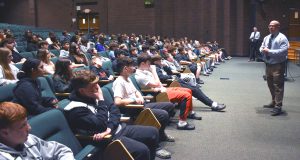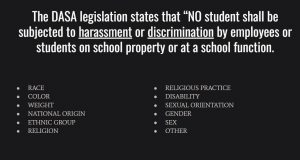
Minisink Valley’s academic instruction regularly includes refresher conversations with students about behavioral expectations and conduct, such as with the Middle School’s recent presentations about the Dignity for All Students Act (DASA), which is part of the district’s ongoing education curriculum.
DASA was enacted in July 2010 to promote a safe and supportive learning environment in all public and charter schools, free from harassment and discrimination for students.
Under DASA, no student shall be subjected to harassment or discrimination by employees or students on school property, or at a school function, based on their actual or perceived race, color, weight, national origin, ethnic group, religion, religious practice, disability, sexual orientation, gender or other related categories.
Middle School Principal Michael Larsen and Assistant Principal Thomas Rickard, who is also the school’s DASA coordinator, led groups of students through reminder conversations about DASA, which included discussions about prejudices, stereotypes, biases, bullying and the importance of being an ally to someone in need.

“Our expectation is that you are welcoming to others, respect others and make others feel included,” Mr. Larsen said. “Words of hate are not welcome here. Hate has no home at the Middle School.”
Students were minded of the consequences of inappropriate speech or social media postings.
“We all have scars from words,” said Mr. Larsen. “Words are powerful and can be used to build people up or tear them down. Scars from hurtful words can last a lifetime.”
Mr. Rickard stressed to students that it’s important they think before they speak or write.
“We don’t want you to make bad choices that are hurtful to others or yourself,” he said. “The negative choices you make at 12 or 13 can impact you when you’re 18 or 20. When you walk in here, you need to ask yourself every day: ‘How am I going to make our school better than it was yesterday?’”
The presentations included reminders about historical events, with both administrators noting that history is taught as teachable moments to not repeat negative moments that many individuals or groups experienced.
“It’s unfair and sickening what happened to certain groups,” said Mr. Larsen. “Here’s what is fair: That everyone has self-worth and self-dignity. We don’t want history to repeat itself in our building. Before you open your mouth, think about what you say. Before you post on social media, think about what you write. Do not speak or say anything about someone that would upset you if it was spoken or written about you. What you do matters. There are severe consequences for inappropriate behavior. We believe everyone should be able to around this building with dignity and respect for others.”
